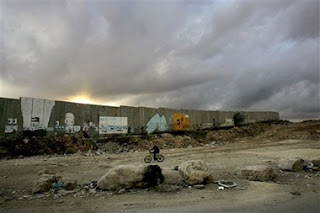by Yahav Zohar –
 “The End of Spring” is the only book I’ve read by prolific novelist Sahar Khalifeh. I’ve heard and read that it is not her best, and I am inclined to agree that as a novel it is far from perfect. Characters tend to be roughly sketched and bordering on stereotype, the storyline is sometimes hard to follow or believe, and narrative is often sidelined in preference to in discussions of political and social issues. Despite this, because of some of it, it has been a very significant read.
“The End of Spring” is the only book I’ve read by prolific novelist Sahar Khalifeh. I’ve heard and read that it is not her best, and I am inclined to agree that as a novel it is far from perfect. Characters tend to be roughly sketched and bordering on stereotype, the storyline is sometimes hard to follow or believe, and narrative is often sidelined in preference to in discussions of political and social issues. Despite this, because of some of it, it has been a very significant read.The book begins as a classic coming of age story – two brothers in a small West Bank town, one introverted and clumsy, the other energetic, charismatic and handsome. The first, it seems will discover himself as a painter or photographer, the other as a popular singer, and both will be forced to confront their authoritarian father, the journalist. Since no dates are given the reader is unaware, just as the brothers are, of what is about to come crushing down on them.
The Second Intifada dashes our expectations as it does the brothers’ lives, their town, their family and their society. The narrative too seems crushed alongside the so many cars flattened “like cockroaches” under the chains of Israeli tanks rolling into Nablus. Instead of photography prizes and rock concerts now there is arrest, torture, crucifixion to the front of a tank as human shields, life under siege and the disintegration of family and society.
Linear time, character development, hopes and dreams and even personality are pushed to the side. What determines fate is not who you are but where you happen to be – when the corrupt PA politician is assassinated, when the tanks roll in, when the curfew is called. New characters appear and disappear, time elapses unmentioned and people change almost beyond recognition. Somehow though, almost all of this makes sense.
Hiding in cellars or under olive trees, crouching behind crumbling walls in the old city of Nablus or with the besieged Arafat in his constantly bombarded Ramallah compound, characters turn to honest and poignant thought and conversation. How did all this come about? How can it be ended? What does it mean and what of any significance can be done within this impossible situation? Here is an unblinking look at Palestinian society, which far from absolving Israel and its Western allies, mostly ignores them or accepts them as a given. Instead, the question is asked repeatedly: what can we the occupied, the seemingly powerless, do?
The real tragedy, the one most powerfully conveyed here, is that of disillusionment – the loss of faith in parents, leaders, ideas. The loss of the brothers’ youth is the loss of a society’s faith in itself and the order of the world. In the face of so much arbitrary violence people despair, become cynical, revert to the comfort of religious faith or turn to a hopeless and doomed sort of heroism. None of these options is exactly condoned, but they are each given a real voice and presented with compelling empathy.
Khalifeh is sometimes credited as ‘the first feminist Palestinian novelist’ and women do stand out here. They are the only ones, it seems, who stay themselves in the face of this onslaught. The hard working single mother becomes ‘Madame Mayor’ of her Nablus neighborhood under siege, organizing food and shelter, sharing out warm clothing alongside faith and hope, acting as surrogate mother to so many lost boys; the foreign educated daughter of the corrupt politician becomes an honest journalist at the front line and so on. The women, unlike the men, never bought in to the lofty ideals of their patriarchal society, as they were always aware of its shortcomings. And so, when traditional structures collapse, they persevere and even blossom.
But Khalifeh is not just a feminist. It is remarkable that writing from within the West Bank at such a time of crisis, she is able to extend her sympathy to settlers (particularly the children raised in settlements) to young lost Israeli soldiers, to corrupt politicians and even to a little white cat who plays a dramatic role in the story, while there still is one.
What emerges is a picture devoid of propaganda – nationalist, feminist, religious or otherwise. All living things, as one of the characters insists, have souls and consciousness, they all deserve our attention. For those who experienced the destruction of the West Bank only on television, where Palestinians were terrorists or collateral damage, faceless, nameless killers and casualties, ‘The End of Spring’ may act as eye-opener. Here is what it feels like to be unarmed and uninformed when the tanks roll in to ‘restore security’, ‘scorch consciousness’ or ‘bring democracy’, here is what life is like at the other end of ‘the war on terror’.



Comment (0)